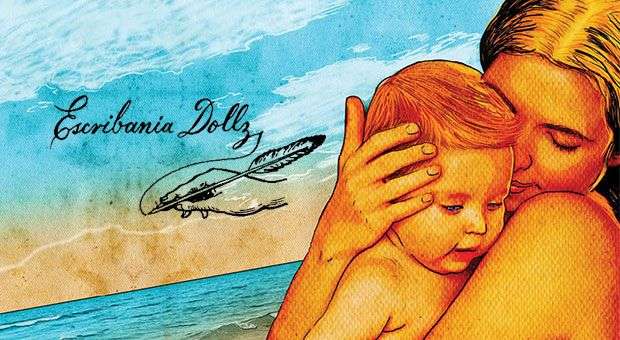Liudmila Quincoses (Sancti Spíritus, 1975) is a poet. She holds a degree in Literature and Spanish. At the age of 19, she won the Santa Clara Foundation Award for her poetry collection, Un libro raro [A strange book]. Her poetry has been published in anthologies in the United States, Argentina, Spain, Germany, Italy, and Mexico, and in the magazines El Caimán Barbudo, La Gaceta de Cuba, Casa de las Américas, and others, both Cuban and international.
Liudmila enjoys writing, and perhaps that is why in 1994, in the midst of the severe economic crisis, she had the idea of hanging a sign on her front door that said: “Escribanía Dollz [Dollz Scribe’s Desk]. Love letters written anytime.”
She waited for more than a month for her first customer, and since then, she has been writing love letters non-stop. “Over the years I’ve seen many sad eyes, restless hands, and symptoms of anguish. Being a scribe means being committed to soothing that loneliness and reconstructing stories. But most of all, it means being somebody who cares very much about a person who has set embarrassment aside and has come to involve you in his or her problem. Entering the lives of two people means also having the authority to change that story.”
Now Escribanía Dollz is not just a place where people go when they know that Liudmila’s left-handed writing will produce the words that will somehow change their lives. Liudmila decided to refound her Escribanía and make it into a community project (Alternative Cultural Center) that hosts exhibitions of paintings, lectures, conferences, book launches, and a very special international love letter contest.

Villa of Santo Espíritu, April 4, 2014
Dear mothers and fathers everywhere:
I think that we are unable to understand our parents until we are the same age that they were when they conceived us. It is impossible for us to appreciate the sacrifice and dedication of our mothers until we ourselves become mothers. It is like a snake that bites its tail, an infinite circle that, throughout the long spirals of the centuries, weaves many generations.
I would not be who I am today if not for the exemplariness and strength of my mother and grandmother in raising me, and also their tenderness, sensitivity and love. I think that it was with my mother that I discovered nature, love for animals and plants, and respect for all living things in this world. I remember that as a girl, we used to vacation in La Boca, a beach near Trinidad. When those lovely summer days would come to an end, I would become very sad and, holding my mother’s hand, I would walk along the beach and say good-bye to the rocks, water, and fish. She taught me how to say good-bye, but at the same time to keep part of that beauty within, to hold onto it like a talisman or a lamp that brought light to my days, and like an antidote against sadness. It was my mother who collected my earliest poems and took them to her excellent friend and Cuban poet Reinaldo García Blanco, because she was convinced that I was going to be a writer, and because she believed in me. She never rewarded me with presents for earning good grades, because studying was my duty, and I’m grateful to her for that. I don’t know anybody who is more hard-working and persevering, optimistic and faithful, for whom there is no difficulty that can’t be overcome or goals that are unattainable. I think that the link of pregnancy creates a very special rapport between mothers and their children.
Parents are our pride. Parents makes sacrifices for their children; they always seek to teach them the best way, to show them confidence, and to help them learn that life is made out of responsibilities, effort, and discipline. That is why parents are so necessary in childhood and throughout life. In the shadow of their wisdom, we grow and are forged as useful, happy human beings.
I would like to offer a poem that I wrote on the day I gave birth, and which is part of my Libro de la Espera [The Book of Waiting]. Maternity is a state of grace, an absence of self, a feeling that leads us to rethink our lives, in philosophical and practical terms. Different processes occur within each woman; I, through words, attempted to relive that emotion that I experienced when I encountered my daughter, eight years ago now, and to preserve this poem for her as a testimony of my love.
They announce you and now you’re coming.
They remove you from my body at that moment
when the darkness of the uterus opens up,
there where you lived.
They have opened my womb like petals of blood,
you finally meet the light,
turn your bright eyes on the deformed world.
I see them rock your body, far away,
I hear you cry.
You are here, your hands cling, those little fingers grab hold,
and for the first time find other hands,
your cry is so strong.
I do what women have done since ancient times,
I soothe you with my breast,
your lips and your body burn within me.
The first thing I hear
after your birth is the rain.
The lights of the operating room are off
and together, for the first time,
we listen to the beautiful sound of rain.
In silence we celebrate
the miracle of our encounter.
A big kiss and hug from Escribanía Dollz [Dollz Scribe’s Desk].










